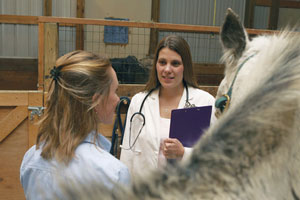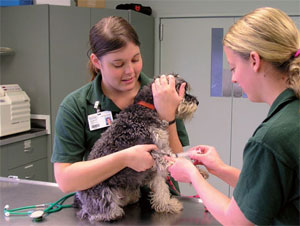Veterinary Nurse
Tasks & duties

Veterinary nurses may do some or all of the following:
-
clean the cages and surgery areas, and carry out general cleaning duties at a veterinary clinic
-
carry out administrative and receptionist duties at a clinic and give advice to clients over the phone
-
liaise with clients
-
order stock and help to look after the retail sales side of the practice
-
feed and exercise animals
-
perform diagnostic tests and keep records
-
perform duties on behalf of veterinarians, such as taking and developing x-rays, collecting blood samples, and testing animals for pregnancy
-
care for sick and injured animals, and look after them before and after an operation
-
clean, sterilise and prepare surgical instruments and other equipment used during operations
-
assist during surgical operations including monitoring the anaesthetic
-
administer medication and injections
-
accompany and assist veterinarians on call outs to locations such as houses and farms
-
run or help to run support services including animal weight loss clinics and dog training classes
Skills & knowledge

Veterinary nurses need to have:
-
animal-handling skills
-
knowledge of basic science, including the anatomy and physiology of animals
-
knowledge of animal care, hygiene and medicine
-
the ability to handle stressful emergency situations
-
good communication skills
-
organisational skills
Computing skills and a knowledge of office procedures are also useful.
Entry requirements
To become a veterinary nurse, it is preferred that you have a first year Certificate in Veterinary Nursing or a qualification in animal care. There are a variety of veterinary nurse training courses available and some may be done part-time through correspondence.
Secondary education
There are no specific secondary education requirements to become a veterinary nurse. However, year 12 Certificate of Education or Higher School Certificate equivalent English and biology are useful to enter further training.
Training on the job
Many skills are gained on the job. There are conferences, workshops and seminars to help veterinary nurses keep their skills and knowledge up to date.
Useful experience
Work as a kennel hand, groomer or any other work involving animals is useful. Many veterinary nurses spend time working for a range of practices on a voluntary basis before beginning full-time work.
Video
from WA career Centre on you tube
Related courses
Veterinary Assisting
For more information, please refer to myfuture.
Document Actions
